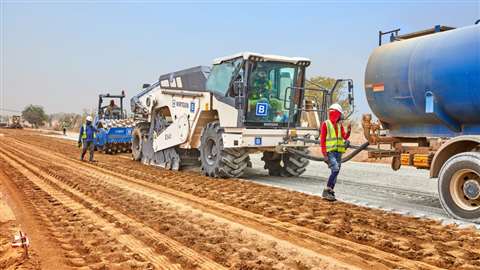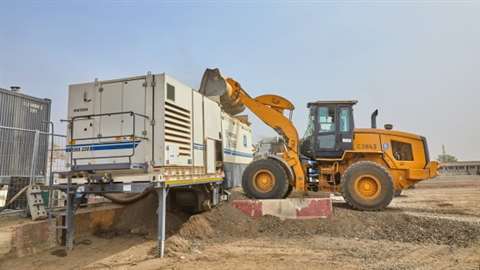Wirtgen Group and JBN work together in Nigeria
11 November 2021
The project is an environmentally friendly reconstruction of a 375km of road
 The Wirtgen soil stabilisers homogeneously mix the previously distributed cement into the road bed at the required depth.
The Wirtgen soil stabilisers homogeneously mix the previously distributed cement into the road bed at the required depth.
The Nigerian Federal Ministry of Works and Housing has enhanced their contract with Julius Berger Nigeria Plc (JBN) from rehabilitation to the reconstruction of the dual carriageway A2 highway, which connects the capital city of Abuja with Kano.
This project said to be of enormous economic relevance to Nigeria and the continent of Africa as the Abuja-Kaduna-Zaria-Kano Road (AKR) is a part of the ‘Trans-African Highways’ - a network comprising transcontinental road construction projects in Africa.
The project aims to stimulate the African economy by creating a well-developed network of roads and therefore connecting economically weaker regions with the stronger areas.
The country sees the importance of using environmentally friendly technologies when developing infrastructure and therefore has employed the cold recycling method. This is considered as an alternative to conventional road construction methods and was one of the factors that led to JBN winning the contract.
The cold recycling process involves mixing foamed bitumen into the existing construction materials, with an in situ cold recycler, or with a mobile cold recycling mixing plant located close to the construction site. The newly produced bituminous mix is known as BSM (bitumen-stabilised material). After paving and subsequent compaction, BSM is characterised by long-term durability and high load bearing properties.
Julius Berger has adopted this construction method as the best long-term solution and sees it as a real innovation in the Nigerian road construction sector.
“Cold recycling enables optimal use of existing construction materials and conserves valuable resources. This is why we are the first construction company in Nigeria committed to exploiting the full potential of this technology for our company and our clients,” said Project Director Benjamin Bott.
 Wheel loaders feed the crushed material to the Wirtgen KMA 220.
Wheel loaders feed the crushed material to the Wirtgen KMA 220.
The cold recycling method gives savings of up to 50% of the binding agents required – which continues to be the largest cost factor in road rehabilitation projects.
Thanks to the special properties of BSM, cold recycling technology leads to extremely low costs throughout the service life of roads – as is the case with the Abuja-Kaduna-Zaria Road in Nigeria.
The completion of the project is scheduled for 2023, and the completion deadline for special structures has been set for early May 2024.




